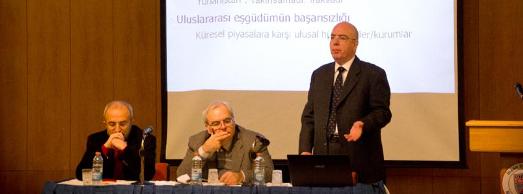Three Experts Discuss EU Developments
Photograph by Kaan Ünlü (CS/IV)
On Friday, the last seminar of the GE 441 FEASS Interdisciplinary Senior Project Course on the European Union was held in C-Block Auditorium. At the seminar, economic and social developments in the European Union were discussed by three guest lecturers: former governor of the Turkish Central Bank Süreyya Serdengeçti, columnist and academician Prof. Fatih Özatay and former member of the State Planning Organization of Turkey Yusuf Işık.
In Prof. Özatay's presentation, a comparison was made between the current crisis in Greece and the economic crisis experienced in Turkey in 2001. He pointed out that Greece and some parts of Europe are in this situation because they have a monetary union but not a banking and fiscal union. Since Turkey had its own currency, its plan for emerging from the 2001 crisis availed, but since Greece uses the euro, they cannot prepare a plan on their own and thus are experiencing great difficulties.
Mr. Serdengeçti spoke next. He started by noting that while the EU has some problems now, it should not be forgotten that the Union has had sixty years of overall success, following a period in which European countries had fought many wars. In his view, the EU is a unique democracy and peace project, with great successes in a number of areas although with some weaknesses in others, such as a lack of strong leaders able to take responsibility for fixing problems. Mr. Serdengeçti concluded by discussing Turkey's prospects for EU membership, saying that the country must work harder to fulfill all of the membership criteria.
Finally, Mr. Işık spoke about the European Union development process. He observed that some countries still cannot get used to the idea of union, with nations such as Spain, Portugal, Italy and Britain having little or no loyalty to the EU. Like Mr. Serdengeçti, he regards the EU as a great peace project, and one that was initially founded for purposes of political union despite current difficulties in this area. Finally, Mr. Işık pointed to what he called a gap between highly educated people and non-educated people in the European Union as a leading reason why the EU cannot implement some reforms.
